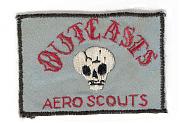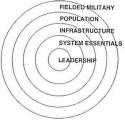Marc, forgive an old guy who hasn't progressed much beyond late 20th Century technologyI readily concede that there is a whole raft of new media that could be delivered by Commando Solo or from a much greater distance by other means. I would also argue that small wars thinking - as most of us would - goes way beyond info war. As in all war, we still have to put steel on target at the same time as we win hearts and minds and disrupt C4I++++.
Some of this obviously means thinking outside the proverbial box (although we better not forget what is inside the box in our newfound enthusiasm). Two of the most innovative strategic thinkers whose work is emminently adaptable to small wars are Air Force - Boyd with his OODA Loop and John Warden with his "inside out warfare" and 5 strategic rings. One can, of course, use these ideas in a purely conventional sense or apply them to small wars in innovative ways - as, indeed, one can with Clausewitz.
Although this story comes from Desert Storm, I think it is applicable to this discussion. My good friend, the late AF Col., Ben Harvey worked for Warden in Checkmate. Ben told me that in planning for the air campaign, they had come up with a bombing approach to taking down the Baghdad power grid that would be only temporary and it could have been restored in a very short time. Had it been employed (it obviously was rejected) a significant amount of civilian hardship could have been avoided. The short term psychological impact would have been enormous but think of the possible long term effects given the current civil war and insurgency in Iraq.





 What I do want to see is what exactly this approach is based on, not word counts or bullet point titles. I'd expect the same thing from anyone who says he has a solution or possible technique for COIN.
What I do want to see is what exactly this approach is based on, not word counts or bullet point titles. I'd expect the same thing from anyone who says he has a solution or possible technique for COIN.


 .
.




Bookmarks